| Srl | Item |
| 1 |
ID:
120414
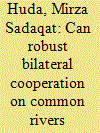

|
|
|
|
|
| Publication |
2013.
|
| Summary/Abstract |
The Himalayan river system, which is made up of the Ganges, Brahmaputra and Meghna rivers, has a combined drainage area that covers the countries of China, India, Nepal, Bhutan and Bangladesh. The basin of the Indus river, which originates in the Tibetan plateau, is the lifeline of regions in China, Pakistan, India and Afghanistan. The perception of the subcontinent being an India-centric region does not arise solely from the disparities in resources and power, but also from the geographic reality of all countries in the region sharing a border with India, and some of the most significant rivers passing through its territory. India, thus, stands in a unique position to initiate vigorous multilateral cooperation on water issues in the region. Despite this, the low level of integration, perennial conflicts, mistrust and misinformation that have plagued relations between South Asian countries have hindered regional cooperation on water security.
|
|
|
|
|
|
|
|
|
|
|
|
|
|
|
|
| 2 |
ID:
120413
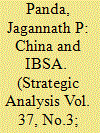

|
|
|
|
|
| Publication |
2013.
|
| Summary/Abstract |
The India-Brazil-South Africa (IBSA) forum, which was formalised in June 2003 through the adoption of the Brasilia Declaration based on the spirit of South-South solidarity, turns a decade old in 2013. The event will be celebrated at its first decadal summit in New Delhi. At the same time, this event needs to be juxtaposed with the fifth consecutive leadership summit of Brazil-Russia-India-China-South Africa (BRICS) in Durban in March 2013. Both IBSA and BRICS are in the limelight for their cross-continental politics. It has also been noted that China may have upped the ante against India by bringing South Africa into BRICS to demote IBSA as a multilateral organisation.
|
|
|
|
|
|
|
|
|
|
|
|
|
|
|
|
| 3 |
ID:
120415
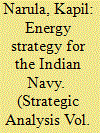

|
|
|
|
|
| Publication |
2013.
|
| Summary/Abstract |
Energy' is a key enabler of military combat power and it should be considered a strategic resource for the Indian Navy (IN). This article justifies the necessity of ensuring energy security for the IN in the backdrop of emerging energy challenges. It also discusses certain recent developments that point to the growing relevance of an energy policy for the IN. The article then discusses the contours and the scope of an integrated energy policy and proposes a roadmap for implementing an energy strategy for the IN. The article concludes that a well-executed energy strategy will ensure a sustainable and energy-secure future for the IN in the coming decades.
|
|
|
|
|
|
|
|
|
|
|
|
|
|
|
|
| 4 |
ID:
120411
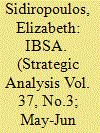

|
|
|
|
|
| Publication |
2013.
|
| Summary/Abstract |
In his opening address at the 2011 India-Brazil-South Africa (IBSA) summit held in Pretoria/Tshwane, President Jacob Zuma of South Africa said the essence of the grouping was 'Back to Basics: When Democracy and Development Work Together for a Better Life'. He argued that the 'basic building block of the kind of societies the IBSA countries continue to strive for' are those where 'democracy and development work together' because such societies 'prosper and create a better life for their people'.
|
|
|
|
|
|
|
|
|
|
|
|
|
|
|
|
| 5 |
ID:
120412
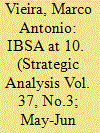

|
|
|
|
|
| Publication |
2013.
|
| Summary/Abstract |
This commentary engages with the IBSA model of South-South development assistance. It focuses on the IBSA Trust Fund to demonstrate the growing political relevance of the partnership in development assistance initiatives. This is followed by an analysis of Brazil's increasing participation in South-South development assistance in many developing countries around the world. I argue that the strategic mission for the IBSA states in the coming decades, as a new normative/ordering power in international relations, is to further its political authority and legitimacy by expanding and refining its South-South development assistance framework. This can be done by integrating new thinking on environmental sustainability as a central-albeit neglected-pillar of their common framework.
|
|
|
|
|
|
|
|
|
|
|
|
|
|
|
|
| 6 |
ID:
120417
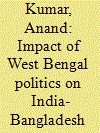

|
|
|
|
|
| Publication |
2013.
|
| Summary/Abstract |
It was expected that Prime Minister Manmohan Singh's visit to Dhaka in September 2011 would transform India-Bangladesh relations. However, this did not happen as India could not sign the Teesta water sharing agreement, the biggest deliverable of the visit. It also made some people brand West Bengal (Paschimbanga) Chief Minister Mamata Banerjee as a spoiler. But did West Bengal stop central government from achieving a historic diplomatic breakthrough for narrow political objectives, or were its leaders only protecting their state interests, which central government may not have been fully able to understand being far away from the region? This article examines the impact of West Bengal politics on India-Bangladesh relations and argues that the role played by the states can often add value to foreign policy making and might actually prevent the centre from jeopardising local interests, thereby protecting national interests as well. The India-Bangladesh relationship can improve if treaties are negotiated in such a way that they become win-win for both sides. This will happen if the treaties are signed after due diligence, taking into account all stakeholders, and if they are implemented sincerely.
|
|
|
|
|
|
|
|
|
|
|
|
|
|
|
|
| 7 |
ID:
120416


|
|
|
|
|
| Publication |
2013.
|
| Summary/Abstract |
India's relationship with the nuclear non-proliferation regime deteriorated sharply after its 1974 underground nuclear test which, according to India, was a peaceful nuclear explosion, but which was not accepted as such by the regime. That it did not follow up with immediate weaponisation challenged the core logic of the non-proliferation regime which operates on a Murphy's Law of 'nuclear fatalism', i.e. if a country has the know-how to produce nuclear weapons, it will certainly produce them. This article argues that at least until the beginning of its integrated guided missile development programme in 1983, India's nuclear inaction posed a normative challenge to this logic.
|
|
|
|
|
|
|
|
|
|
|
|
|
|
|
|